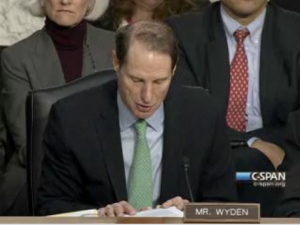Ron Wyden Suggests Secret PATRIOT GPS Tracking May Be Illegal Under Jones
 As I’ve suggested in my posts on US v Jones, the Justices seemed opposed to the kind of tracking we believe the government is doing under Section 215 of the PATRIOT Act. Yet of the three opinions ruling the warrantless use of GPS tracking in the case improper, only Sonia Sotomayor spoke broadly enough to make it clear that the Secret PATRIOT application is unconstitutional.
As I’ve suggested in my posts on US v Jones, the Justices seemed opposed to the kind of tracking we believe the government is doing under Section 215 of the PATRIOT Act. Yet of the three opinions ruling the warrantless use of GPS tracking in the case improper, only Sonia Sotomayor spoke broadly enough to make it clear that the Secret PATRIOT application is unconstitutional.
Ron Wyden (who, remember, wrote a column on Jones’ application to Secret PATRIOT) used yesterday’s Threat Assessment hearing to try to get James Clapper to commit to whether US v Jones makes Secret PATRIOT illegal. (2:25)
Wyden: Director Clapper, as you know the Supreme Court ruled last week that it was unconstitutional for federal agents to attach a GPS tracking device to an individual’s car and monitor their movements 24/7 without a warrant. Because the Chair was being very gracious, I want to do this briefly. Can you tell me as of now what you believe this means for the intelligence community, number 1, and 2, would you be willing to commit this morning to giving me an unclassified response with respect to what you believe the law authorizes. This goes to the point that you and I have talked, Sir, about in the past, the question of secret law, I strongly feel that the laws and their interpretations must be public. And then of course the important work that all of you’re doing we very often have to keep that classified in order to protect secrets and the well-being of your capable staff. So just two parts, 1, what you think the law means as of now, and will you commit to giving me an unclassified answer on the point of what you believe the law actually authorizes.
Clapper: Sir, the judgment rendered was, as you stated, was in a law enforcement context. We are now examining, and the lawyers are, what are the potential implications for intelligence, you know, foreign or domestic. So, that reading is of great interest to us. And I’m sure we can share it with you. [looks around for confirmation] One more point I need to make, though. In all of this, we will–we have and will continue to abide by the Fourth Amendment.
Given Clapper’s quick invocation of the law enforcement context, I suspect the Intelligence Community’s lawyers are planning to use the language in Samuel Alito’s concurring opinion addressing “extraordinary offenses”…
We also need not consider whether prolonged GPS monitoring in the context of investigations involving extraordinary offenses would similarly intrude on a constitutionally protected sphere of privacy. In such cases, long-term tracking might have been mounted using previously available techniques.
…To claim that their intelligence application–“foreign or domestic”–would still permit the tracking of innocent citizens using their cell phones.
In any case, if Clapper is good on his word (though note, he said he’d give this interpretation to Wyden, not release it publicly), the government may finally tip its hand regarding its cell phone tracking of Americans.


All they have to do is claim “national security” and magically the system of checks and balances disappears.
Hide yer wimmens and chillen. Cause there is some bad ass trash rollin your way like a nasty hurricane squall front. Don’t say I didn’t warn you. And if I see mention of Brady porn here or on Twitter, bad things, very bad things, will result.
@bmaz:
like a nasty, dusty, thorny, resinous-smellin’, wheel-of-fire,
tumbulin’ tumbleweed – strum, strum.
i can smell the horse sweat and the – oh never mind – from here.
ride’em, bmaz!!
giants by 3-10 pts – unless giants enter a “rocket screen” (mental) zone.